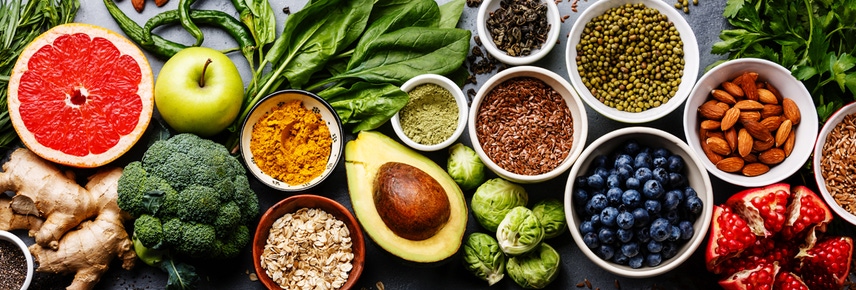
Supplements vs food: what's the best way to get more nutrients?
From weight loss hacks to household DIY, Aussies are always on the hunt for a quick fix. And it’s no different when it comes to our health.
Eating a diet that consists of fruits, vegetables, wholegrains, legumes, dairy and protein will deliver bangs of nutrients. Yet in our hectic and increasingly demanding lives (where fast foods and pre-packed meals can often win out) more and more of us are turning to supplements to get the nutrients we need.
Just one in five Australians are getting enough veggies in their diets and yet 8.1 million Australians regularly use supplements. The vitamin and dietary supplement industry is worth a staggering $2.77 billion each year, and continues to climb.
So, are supplements the solution to filling dietary gaps? And if so, which ones actually work? For the answers to these questions and more, we turned to our dietitian, Angela Saunders.
In Australia, supplements don’t receive the same level of testing by the Therapeutic Goods Administration (TGA) as prescription drugs. The TGA only checks that the supplement products meet safety and quality criteria. But manufacturers don’t need to prove to that their products actually work, so you could be flushing money down the toilet quite literally.
Eating a diet that consists of fruits, vegetables, wholegrains, legumes, dairy and protein will deliver bangs of nutrients. Yet in our hectic and increasingly demanding lives (where fast foods and pre-packed meals can often win out) more and more of us are turning to supplements to get the nutrients we need.
Just one in five Australians are getting enough veggies in their diets and yet 8.1 million Australians regularly use supplements. The vitamin and dietary supplement industry is worth a staggering $2.77 billion each year, and continues to climb.
So, are supplements the solution to filling dietary gaps? And if so, which ones actually work? For the answers to these questions and more, we turned to our dietitian, Angela Saunders.
Should I get my nutrients from food instead of supplements?
Supplements are not intended to be a substitute for food.
When you eat whole plant foods, you’re actually getting many more nutrients than a tablet can provide. In addition to essential vitamins and minerals, whole foods are also packed with fibre and thousands of other protective bioactive compounds, like antioxidants and phytonutrients.
Subscribe to Wholicious Living to stay up-to-date with the latest health and nutrition advice.
Science shows that eating your five-a-day is really the best and most simple way of meeting your daily nutritional needs. In fact, studies have failed to prove that certain supplements have any health benefits. In Australia, supplements don’t receive the same level of testing by the Therapeutic Goods Administration (TGA) as prescription drugs. The TGA only checks that the supplement products meet safety and quality criteria. But manufacturers don’t need to prove to that their products actually work, so you could be flushing money down the toilet quite literally.
Are there any supplements that are worth taking?
There is scientific evidence to support the use of particular supplements, with some of the most commonly recommended by health professionals being:- Vitamin B12 – This vitamin helps our bodies produce blood cells and supports immunity and normal mental function. Vitamin B12 is found almost exclusively in animal-based foods. Anyone who limits the intake of these foods (especially vegans) needs to ensure they supplement their diet with vitamin B12 and/or include B12 fortified foods in their diet. This is especially important for vegan women who are pregnant or breastfeeding. Look for vitamin B12-fortified plant milks, yeast spreads and plant-based meat alternatives. If you do eat some animal foods, eggs and dairy products contain B12.
- Vitamin D – Vitamin D is important to maintain strong bones and muscles and for preventing conditions like osteoporosis. Most of our vitamin D comes from exposure to the sun with only a small amount available from foods like fortified milks (including plant-based milks), margarines and vitamin D mushroom. If you have little access to safe sun exposure, your health professional may advise you to take a vitamin D supplement.
- Folic Acid – If you are planning on becoming pregnant, it’s important to take a folic acid supplement before pregnancy (to be taken daily one month before), and three months after conception to help prevent neural tube defects. Also, be sure to eat foods fortified with folic acid as well as foods that are naturally rich in folate such as green leafy veggies, legumes, avocado, beets, eggs and citrus fruits.
Are there any supplements that don't live up to the hype?
- Vitamin C – This is one of the popular supplements that many take as a way to prevent or treat a cold, however there’s limited evidence that supports taking such high doses. Vitamin C is an essential nutrient and antioxidant that helps grow and repair tissue and prevents scurvy and you can easily get vitamin C by eating kale, citrus fruits, berries and peas.
- Calcium – Unless you’re under special circumstances and have been advised by your health practitioner to take a calcium supplement, eating enough dairy food (or calcium fortified food such as plant milks, if you don’t consume dairy) is the best and easiest way to get your daily intake of calcium. A meta-analysis shows that taking calcium supplements has inconsistent effects in reducing risk of fracture.
- Multivitamins – There’s limited evidence that a daily cocktail of minerals and vitamins enhances health and wellbeing or prevent illness. There’s no evidence that a multivitamin is harmful, but at the same time, there is no evidence that it’s helpful. More research is needed but if it holds no benefits, it’s probably best not to take it.
What about fortified foods?
Adding synthetic vitamins and minerals to food – the process of ‘fortification’ – has been going on for over 100 years. Important vitamins and minerals may be added to food when there is a great health need, with benefits for the wider population.
In Australia, manufacturers must add vitamin D to edible oil spreads (e.g. margarine) and add thiamine and folic acid to wheat flour, used for making bread. Food Standards Australia New Zealand dictates how much of each vitamin and mineral can be added and which foods can be fortified.
Be aware if you’re taking supplements and eating foods that have been fortified with vitamins and minerals, you may be getting more of certain nutrients than you realise.
Who actually needs supplements?
While supplements shouldn't be the first choice when trying to fill in any dietary gaps, a GP or dietitan may recommend that older adults and others may benefit from specific supplements:- Anyone who consistently eats a limited variety of foods
- Women who may become or are pregnant
- Adults aged 50 or over may need vitamin B12
- Adults aged 65 or over may need vitamin D for prevention of falls and osteoporotic fractures - Anyone who follows a diet that restricts an entire category of foods without appropriate replacement foods
- Vegetarians and vegans who limit or completely avoid dairy and eggs (sources of vitamin B12)
- Women who have heavy bleeding during menstrual period
- Those who have a medical condition or are taking a medication that affects how your body absorbs or uses nutrients, such as chronic diarrhea, food allergies, food intolerance, or a disease of the liver, gallbladder, intestines or pancreas
- Those who have had surgery on their digestive tract and are not able to digest and absorb nutrients properly

The latest nutrition advice, plus health and wellness tips delivered to your inbox monthly

